Filter by
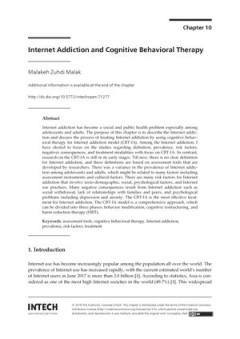
Internet Addiction and Cognitive Behavioral Therapy
Internet addiction has become a social and public health problem especially among adolescents and adults. The purpose of this chapter is to describe the Internet addiction and discuss the process of treating Internet addiction by using cognitive behavioral therapy for Internet addiction model (CBT-IA). Among the Internet addiction, I have elected to focus on the studies regarding definition, pr…
- Edition
- -
- ISBN/ISSN
- 9789535139270
- Collation
- -
- Series Title
- -
- Call Number
- -
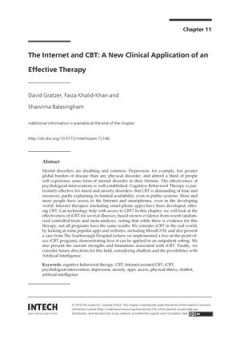
The internet and Cbt a New Clinical Application of An Effective Therapy
Mental disorders are disabling and common. Depression, for example, has greater global burden of disease than any physical disorder, and almost a third of people will experience some form of mental disorder in their lifetime. The effectiveness of psychological interventions is well established. Cognitive Behavioral Therapy is particularly effective for mood and anxiety disorders. But CBT is dem…
- Edition
- -
- ISBN/ISSN
- 9789535139270
- Collation
- -
- Series Title
- -
- Call Number
- -

Internet Addiction and Its Cognitive Behavioral Therapy
Internet Addiction and Its Cognitive Behavioral Therapy
- Edition
- -
- ISBN/ISSN
- 9789535103127
- Collation
- -
- Series Title
- -
- Call Number
- -

Internet Addiction and Cognitive Behavioral Therapy
Internet addiction has become a social and public health problem especially among adolescents and adults. The purpose of this chapter is to describe the Internet addiction and discuss the process of treating Internet addiction by using cognitive behavioral therapy for Internet addiction model (CBT-IA). Among the Internet addiction, I have elected to focus on the studies regarding definition, pr…
- Edition
- -
- ISBN/ISSN
- 9789535139270
- Collation
- -
- Series Title
- -
- Call Number
- -

Imagery Rehearsal Therapy (IRT) Combined with Cognitive Behavioral Therapy (CBT)
In cases of post-traumatic stress disorder (PTSD), nightmares can often persist, even after a cognitive behavioral therapy (CBT) for this disorder. Imagery rehearsal therapy (IRT) is a CBT that targets the treatment of nightmares directly. Objectives: the present study describes the feasibility and the efficacy of combining IRT with first-line, trauma-focused CBT for PTSD. Method: two individua…
- Edition
- -
- ISBN/ISSN
- 9789535139270
- Collation
- -
- Series Title
- -
- Call Number
- -
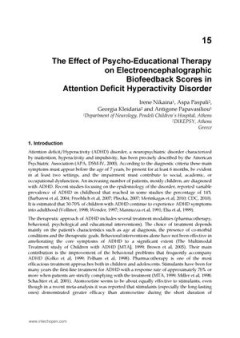
The Effect of Psycho-Educational Therapy on Electroencephalographic Biofeedba…
The Effect of Psycho-Educational Therapy on Electroencephalographic Biofeedback Scores in Attention Deficit Hyperactivity Disorder
- Edition
- -
- ISBN/ISSN
- 9789533078687
- Collation
- -
- Series Title
- -
- Call Number
- -
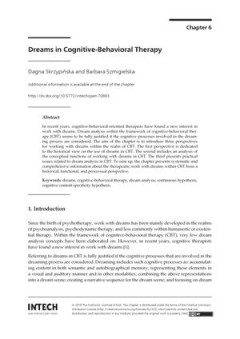
Dreams in Cognitive-Behavioral Therapy
In recent years, cognitive-behavioral-oriented therapists have found a new interest in work with dreams. Dream analysis within the framework of cognitive-behavioral therapy (CBT) seems to be fully justified if the cognitive processes involved in the dreaming process are considered. The aim of the chapter is to introduce three perspectives for working with dreams within the realm of CBT. The fir…
- Edition
- -
- ISBN/ISSN
- 9789535139270
- Collation
- -
- Series Title
- -
- Call Number
- -
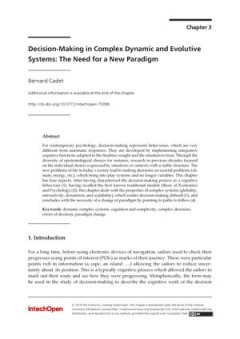
Decision-Making in Complex Dynamic and Evolutive Systems The Need For a New …
For contemporary psychology, decision-making represents behaviours, which are very different from automatic responses. They are developed by implementing integrative cognitive functions adapted to the finalities sought and the situation to treat. Through the diversity of epistemological choices for instance, research in previous decades focused on the individual choices expressed by situations …
- Edition
- -
- ISBN/ISSN
- 9781789237955
- Collation
- -
- Series Title
- -
- Call Number
- -
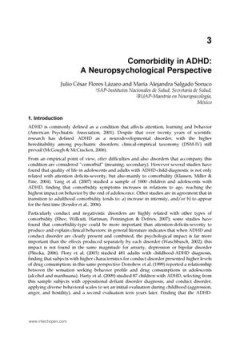
Comorbidity in Adhd a Neuropsychological Perspective
Comorbidity in ADHD: A Neuropsychological Perspective
- Edition
- -
- ISBN/ISSN
- 9789533078687
- Collation
- -
- Series Title
- -
- Call Number
- -

Cognitive-Behavioral Therapy of Obsessive-Compulsive Disorder in Children and…
While obsessive-compulsive disorder (OCD) is present under the category of anxiety disorders in DSM-IV TR, it is classified under “Obsessive Compulsive Disorder and Related Disorders” in DSM 5. There is no different diagnostic system for children and adolescents. OCD has serious adverse effects on family, school, and social lives of children and adolescents, but adolescents with OCD often h…
- Edition
- -
- ISBN/ISSN
- 9789535139270
- Collation
- -
- Series Title
- -
- Call Number
- -
 Computer Science, Information & General Works
Computer Science, Information & General Works  Philosophy & Psychology
Philosophy & Psychology  Religion
Religion  Social Sciences
Social Sciences  Language
Language  Pure Science
Pure Science  Applied Sciences
Applied Sciences  Art & Recreation
Art & Recreation  Literature
Literature  History & Geography
History & Geography